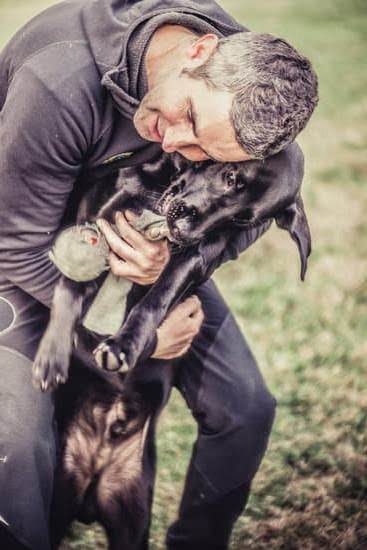Are you looking to enhance your furry friend’s behavior and overall well-being? Look no further than a dog training school.
Training your dog is an essential part of being a responsible pet owner, and it plays a crucial role in shaping your dog’s behavior, helping them become well-behaved and obedient companions. Whether you have a new puppy or an older dog, enrolling them in a reputable dog training school can make a world of difference in their development.
Dog training is not just about teaching basic commands; it is about establishing trust, communication, and building a strong bond between you and your pet. The right training program can address behavioral issues, improve socialization skills, and ensure the safety of both your dog and those around them.
In this article, we will explore the benefits of enrolling in a dog training school, tips for finding the right one for your pet, common techniques used in dog training, and much more. So, let’s delve into the world of dog training and discover how it can positively impact your furry companion’s life.
Finding the Right Dog Training School
When it comes to finding the right dog training school for your furry companion, there are several factors to consider in order to make an informed decision. From the school’s reputation and qualifications of the trainers to the training methods used, pet owners must do their due diligence to ensure that their dogs receive the best possible education and care.
Here are some tips and guidelines for pet owners to choose the best dog training school for their four-legged friends.
Researching Dog Training Schools
Before enrolling your dog in a training program, take the time to research different schools in your area. Look for reviews and recommendations from other pet owners, as well as detailed information about the curriculum and training techniques used. Visiting the facilities and observing a training session can also give you a good sense of the environment and approach of the school.
Evaluating Trainer Credentials
The qualifications and experience of the trainers at a dog training school are crucial in determining its effectiveness. Look for schools with certified trainers who have a strong background in animal behavior and psychology. Additionally, inquire about their approach to training and how they handle specific behavioral issues in dogs.
Understanding Training Methods
Different dog training schools may use various methods and techniques in their programs. It’s important for pet owners to understand these approaches and find one that aligns with their preferences and beliefs. Whether it’s positive reinforcement, clicker training, or obedience training, ensure that the methods used are both effective and humane.
By taking these tips into consideration, pet owners can make an informed decision when choosing a dog training school for their furry companions. This will not only benefit their dogs by providing them with proper education but also contribute to building a strong bond between them based on trust and understanding.
Benefits of Enrolling in a Dog Training School
Enrolling in a dog training school offers pet owners numerous benefits, as professional dog training programs can significantly contribute to the development of a well-behaved and obedient pet. One of the primary advantages of enrolling in a dog training school is access to expert guidance and knowledge.
Professional dog trainers are equipped with the skills and experience to understand canine behavior and effectively teach dogs essential commands and manners. With their expertise, they can tailor training programs to address specific behavioral issues and create a personalized approach for each pet.
Additionally, dog training schools provide a structured learning environment that can greatly enhance a dog’s socialization skills. Interacting with other dogs in a controlled setting helps them learn how to behave appropriately in various situations, reducing anxiety and aggression towards other animals or humans. Moreover, the consistent exposure to different stimuli during training sessions can help desensitize dogs to common triggers that may cause fear or stress, resulting in better behavior overall.
Furthermore, enrolling in a dog training school not only benefits the pet but also fosters a stronger bond between the owner and their furry companion. By actively participating in the training process, pet owners gain valuable knowledge on how to communicate effectively with their dogs, understand their needs, and set clear boundaries. This mutual understanding promotes trust and respect between the owner and their pet, leading to a more harmonious relationship at home.
| Benefits | Description |
|---|---|
| Expert Guidance | Access to skilled professionals who can customize training programs. |
| Socialization Skills | Structured learning environment improves interaction with other dogs. |
| Stronger Bond | Promotes trust and respect between pet owners and their dogs. |
Common Dog Training Techniques
When it comes to dog training, there are a variety of methods and approaches that professional trainers use to help dogs learn and develop good behavior. Here are some common dog training techniques that are utilized in dog training schools:
1. Positive Reinforcement: This method involves rewarding a dog with treats, praise, or toys when they exhibit the desired behavior. By associating good behavior with positive rewards, dogs are more likely to repeat that behavior in the future.
2. Clicker Training: Clicker training is a form of positive reinforcement where a clicker is used as a marker to indicate when the dog has performed the desired behavior. The sound of the clicker is paired with a reward, helping the dog understand exactly what they did right.
3. Obedience Training: Obedience training focuses on teaching dogs basic commands such as sit, stay, come, and heel. Trainers use repetition and consistency to reinforce these commands until the dog becomes obedient and responsive.
These techniques are effective in helping dogs understand what behaviors are expected of them and can lead to well-behaved and obedient pets. Professional trainers at a dog training school are skilled in using these methods to address various behavioral issues and train dogs of all ages and breeds.
At a reputable dog training school, pet owners can expect their furry companions to receive personalized attention and tailored training programs that cater to their specific needs and behavioral challenges. Whether it’s addressing aggression, excessive barking, or separation anxiety, professional trainers will employ these proven techniques to help correct unwanted behaviors and instill good habits in dogs.
Training for Specific Behaviors
Understanding Common Behavioral Issues
When it comes to owning a dog, dealing with behavioral problems such as aggression, excessive barking, and separation anxiety can be challenging for pet owners. These issues can not only disrupt the harmony in your home but also affect the overall well-being of your furry friend. Understanding the root cause of these behaviors is crucial in addressing them effectively, and this is where a dog training school can play a significant role.
Professional Guidance and Support
Enrolling your dog in a reputable dog training school allows them to receive professional guidance and support in dealing with specific behavioral issues. Trainers at these schools are equipped with the knowledge and experience to assess your dog’s behavior, identify triggers for aggression or excessive barking, and develop personalized training plans to address these issues. With their expertise, they can help you understand the motivations behind your dog’s behavior and provide effective strategies to modify it.
Creating a Safe and Positive Environment
Dog training schools create an environment that is conducive to learning and behavior modification. They employ positive reinforcement techniques to promote good behavior while discouraging negative ones. Through structured training sessions, dogs learn to respond differently to stimuli that may trigger aggression or excessive barking.
Moreover, trainers can also address separation anxiety by gradually acclimating dogs to being alone through desensitization exercises. This type of specialized training is best done under the supervision of professional trainers who can ensure that the process is safe and effective for both the pet and owner.
The Role of Professional Trainers
Professional dog trainers play a crucial role in the development and training of dogs. Their expertise and skills can make a significant difference in a dog’s learning process and overall behavior. These professionals undergo extensive training themselves to understand the psychology of dogs, various training methods, and behavior modification techniques. A dog training school is an excellent place for pet owners to find experienced and certified trainers who can help their furry companions reach their full potential.
One of the key advantages of enrolling in a dog training school is the access to professional trainers who have a deep understanding of canine behavior. These trainers can assess each dog’s unique personality, temperament, and any behavioral issues that need to be addressed. They are equipped with the knowledge to tailor training programs based on individual needs, making the learning experience more effective and personalized.
Moreover, professional trainers are proficient in using various positive reinforcement techniques that encourage desirable behaviors in dogs. This type of training focuses on rewarding good behavior rather than punishing unwanted actions, fostering a positive and trusting relationship between the dog and its owner. By enrolling in a reputable dog training school, pet owners can benefit from the expertise of these professionals while also gaining valuable skills to communicate effectively with their pets.
| Benefit | Description |
|---|---|
| Expertise | Professional trainers have extensive knowledge of canine behavior and training methods. |
| Personalized Training | Trainers tailor programs based on individual needs for more effective results. |
| Positive Reinforcement | Trainers use reward-based techniques to encourage good behavior. |
Success Stories
One of the most rewarding aspects of enrolling your dog in a professional dog training school is witnessing the incredible transformation that takes place in their behavior and obedience. These success stories serve as an inspiration for pet owners who may be struggling with their furry companions’ behavioral issues. Here are some heartwarming examples of dogs who have undergone training at a dog training school and have shown significant improvement:
- Agnus, a Golden Retriever, was known for being overly excitable and jumping on guests when they visited his home. After attending a specialized obedience training program at a reputable dog training school, Agnus learned how to control his impulses and greet visitors calmly, much to the delight of his owner and their guests.
- Bella, a rescue dog with severe separation anxiety, used to exhibit destructive behavior whenever her owner left the house. With the help of professional trainers at a dog training school, Bella underwent behavior modification therapy and gradually learned to cope with being alone, leading to a drastic reduction in her destructive tendencies.
- Rex, an energetic Labrador mix, struggled with leash pulling during walks, making it difficult for his owner to take him out for exercise. Through consistent positive reinforcement training at a dog training school, Rex learned how to walk politely on a leash, transforming daily walks into an enjoyable bonding experience for both him and his owner.
These success stories not only showcase the effectiveness of enrolling in a dog training school but also emphasize the significant impact that proper training can have on a dog’s well-being and overall quality of life. From addressing behavioral issues to fostering obedience and good manners, these stories demonstrate the profound benefits of investing in professional dog training programs.
Tips for Continued Training at Home
In conclusion, enrolling your dog in a reputable dog training school can bring about transformative changes in their behavior and overall well-being. By finding the right dog training school and enrolling your furry companion in professional training programs, you can ensure that they receive the necessary guidance and instruction to become a well-behaved and obedient pet.
The benefits of professional dog training are numerous, from addressing specific behavioral issues to fostering a strong bond between you and your canine companion.
Moreover, the role of professional trainers cannot be overstated. Their expertise and skills are invaluable in guiding both pet owners and their dogs through the training process. With the use of various techniques such as positive reinforcement, clicker training, and obedience training, these professionals can make a significant difference in a dog’s learning and development.
While the initial success achieved at the dog training school is crucial, it is equally important for pet owners to continue the training process at home. Incorporating practical tips and techniques learned from the dog training school into your daily routine with your pet is essential for maintaining the positive results achieved.
Consistency, patience, and ongoing practice are key to ensuring that your dog continues to exhibit good behavior and responds positively to commands. By taking an active role in your pet’s ongoing training at home, you can build on the foundation established at the dog training school and enjoy a harmonious relationship with your four-legged friend for years to come.
Frequently Asked Questions
How Do I Become a Certified Dog Trainer in Michigan?
To become a certified dog trainer in Michigan, you can start by gaining relevant experience working with dogs. Then, consider enrolling in a reputable dog training program to learn the necessary skills and knowledge. Finally, you can pursue certification through organizations such as the Certification Council for Professional Dog Trainers (CCPDT).
What Are the 5 Golden Rules of Dog Training?
The 5 golden rules of dog training are based on positive reinforcement and include consistency, patience, effective communication, understanding your dog’s needs, and setting clear boundaries. By following these rules, you can establish a strong foundation for training your furry friend.
How Do I Become a Dog Trainer in North Carolina?
If you want to become a dog trainer in North Carolina, you can begin by getting hands-on experience with dogs through volunteering or working at animal shelters or with professional trainers.
Then, consider getting certified through a recognized organization like the Association of Professional Dog Trainers (APDT) and building a solid reputation within the local community for your training skills.

Welcome to the blog! I am a professional dog trainer and have been working with dogs for many years. In this blog, I will be discussing various topics related to dog training, including tips, tricks, and advice. I hope you find this information helpful and informative. Thanks for reading!





